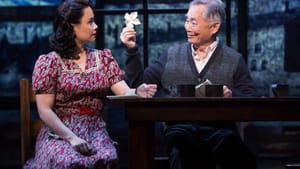Stay in the Loop
BSR publishes on a weekly schedule, with an email newsletter every Wednesday and Thursday morning. There’s no paywall, and subscribing is always free.
History with modern resonance
'Allegiance' on Broadway

As American politicians suggest barring or registering Muslims, this new musical drama reminds us of a similar period of ethnic targeting. Even with its imperfections, Allegiance adds depth to what previously was only a page in a history book.
During World War II, approximately 120,000 people of Japanese ancestry were incarcerated in camps in the interior of the country. Almost two-thirds of the prisoners were born in the United States; it made no difference that many had never even been to Japan. Anyone with at least 1/16 Japanese ancestry — equivalent to having one great-great grandparent — was targeted, while Italian-Americans and German-Americans were not. The internees were not freed until the end of the war, when they were given bus rides and $25 in cash to go back to the towns where their homes had been.
President Roosevelt authorized the deportation and incarceration with Executive Order 9066, issued February 19, 1942. The Supreme Court ruled that the action was a wartime necessity.
There was significant public support for this action. Austin Anson, managing secretary of the Salinas Vegetable Grower-Shipper Association, told the Saturday Evening Post in 1942: "We're charged with wanting to get rid of the Japs for selfish reasons. We do. It's a question of whether the white man lives on the Pacific Coast or the brown men. They came into this valley to work, and they stayed to take over."
The Japanese-Americans had to sell their properties at a loss and give up personal belongings. Audiences at Allegiance see the internees separated into male and female lines, some of them forced to strip to their underwear as they enter the camp. This, of course, shocks us with its similarity to the procedures at Nazi concentration camps.
Frank Abe, creator of the documentary film Conscience and the Constitution, claims that this did not happen at Heart Mountain, the setting for Allegiance. He said the musical "conflates Heart Mountain with the worst of the segregation center at Tule Lake. Heart Mountain had no stockade; that was Tule Lake.” He misses the point with this quibbling; changing details is normal in a drama — especially a drama, like this one, that is based on a personal story. George Takei’s autobiography, which begins with his family’s journey to an internment camp when he was four, serves as one of the sources. He also plays a featured role in the production.
Family conflict
Allegiance shows the fictional Kimura family before and after the Japanese attack on Pearl Harbor, as they are forced to leave their farm in Salinas and relocate to the Heart Mountain internment camp in Wyoming. The Kimuras act out conflicting reactions to their internment. Sammy (Telly Leung) asks to join the army to prove he’s a patriotic American, while his sister’s boyfriend Frankie (Michael K. Lee) leads a protest against the government. “They didn’t lock up Joe DiMaggio,” Frankie says angrily. Sammy's father (Christópheren Nomura) is helpless in his inability to protect his family and goes to prison when he defies the authorities.
The character Mike Masaoka (Greg Watanabe), a spokesman who urged cooperation, is based on a real person. Masaoka, the head of the Japanese American Citizens League, tried to keep his people calm as he worked through channels to allow some internees leave the camps to serve in the armed forces. Separated from their churches and community organizations, internees had no other institution to speak for them.
 Lea Salonga, who made her Broadway debut in 1991’s Miss Saigon, is a standout as the sister. Takei is charming as her grandfather, who genially continues his flower-tending even in the arid Wyoming soil. He also plays the elderly Sammy in a prologue and epilogue.
Lea Salonga, who made her Broadway debut in 1991’s Miss Saigon, is a standout as the sister. Takei is charming as her grandfather, who genially continues his flower-tending even in the arid Wyoming soil. He also plays the elderly Sammy in a prologue and epilogue.
The play asks: How can anyone fight for a country that has imprisoned your family? The story is told with some contrivance but is generally compelling. Most of the music, unfortunately, is unexceptional. Hardly any of it captures a sense of the time or place. A few songs have a Japanese flavor, which is appealing, and there’s a catchy jitterbug number, but most of the score is generic Broadway belting. The best is Salonga’s “Gaman,” which means to “endure with fortitude.”
What, When, Where
Allegiance. Music and lyrics by Jay Kuo; book by Marc Acito, Jay Kuo, and Lorenzo Thione. Stafford Arima directed. Longacre Theatre, 220 W 48th St, New York. 212-239-6200 or allegiancemusical.com.
Sign up for our newsletter
All of the week's new articles, all in one place. Sign up for the free weekly BSR newsletters, and don't miss a conversation.

 Steve Cohen
Steve Cohen